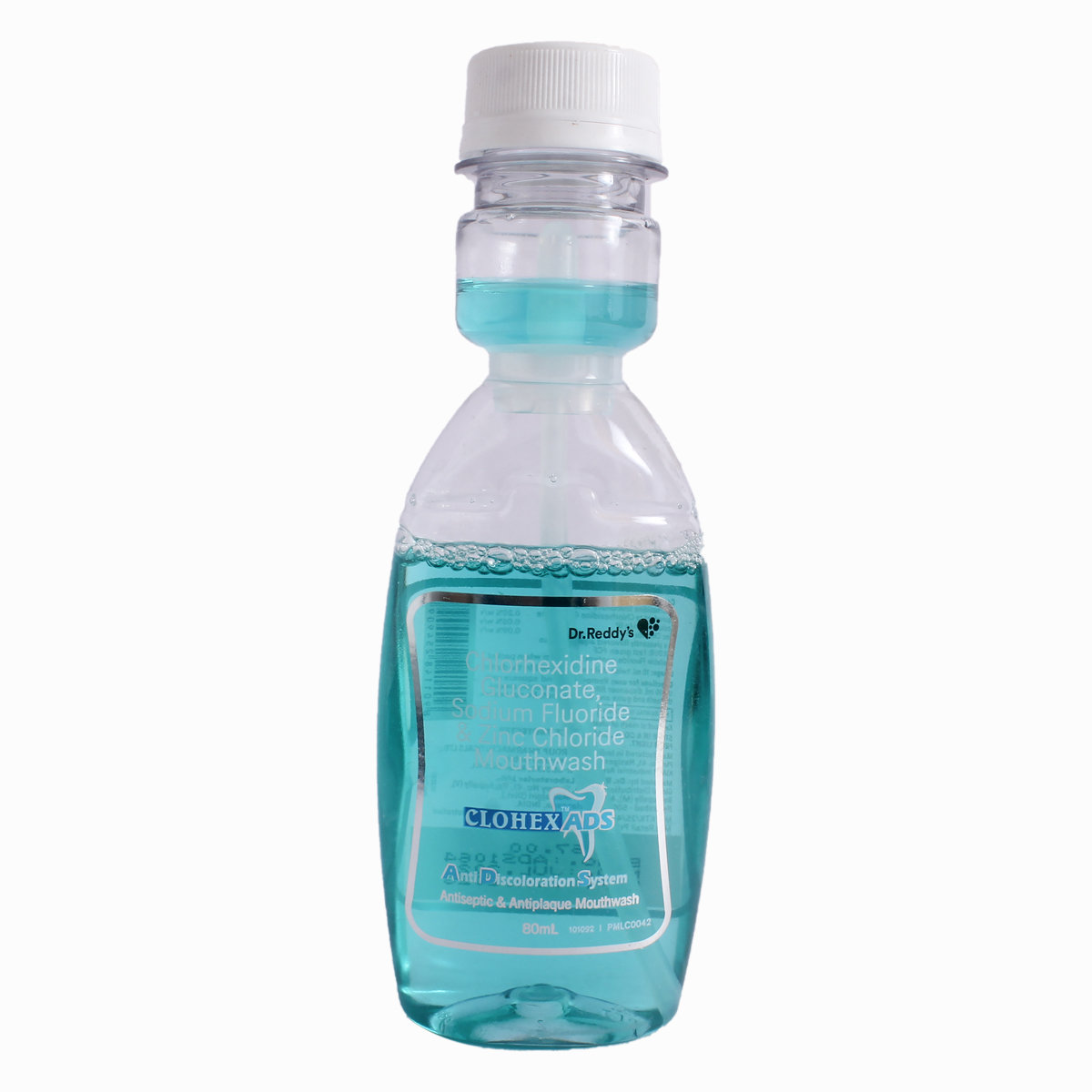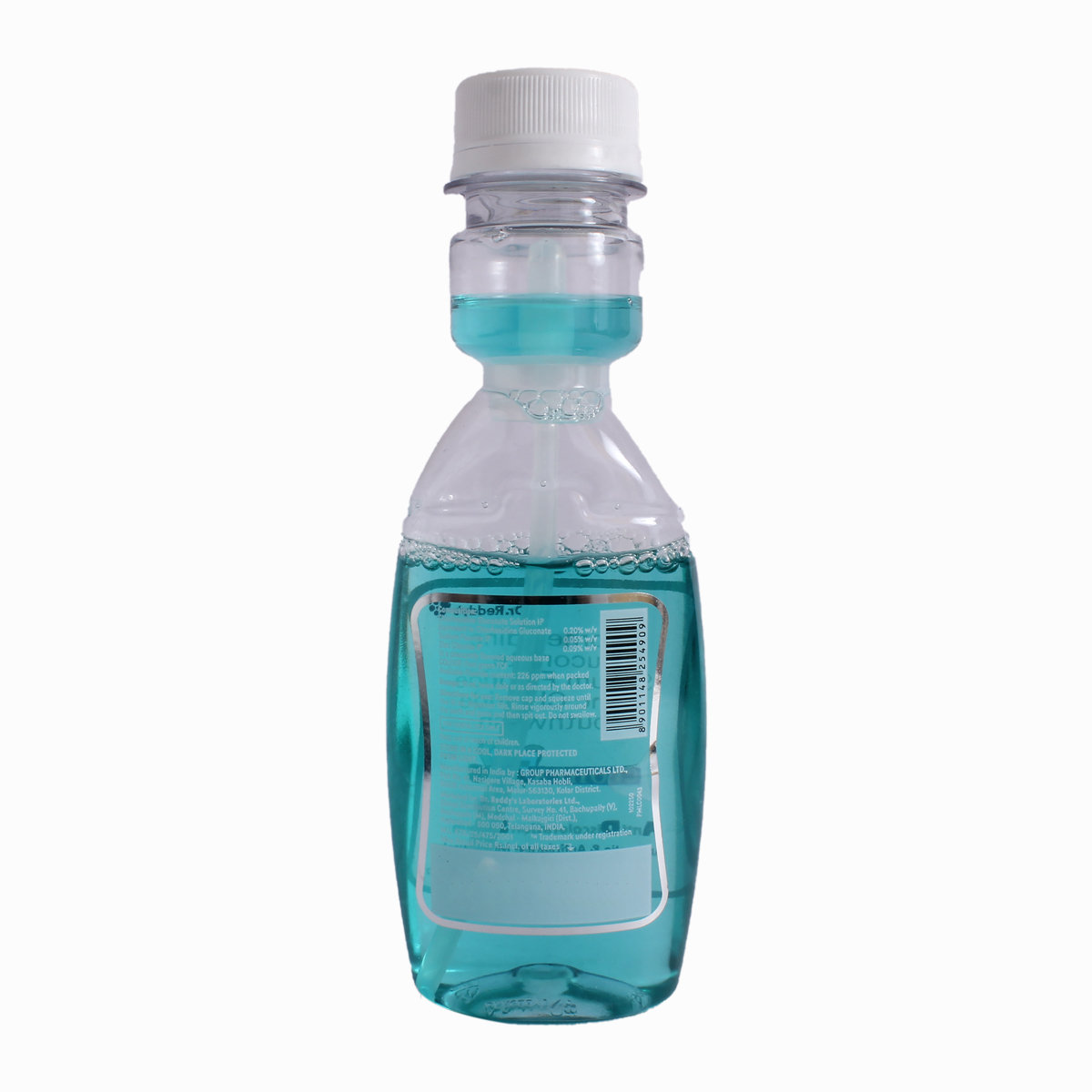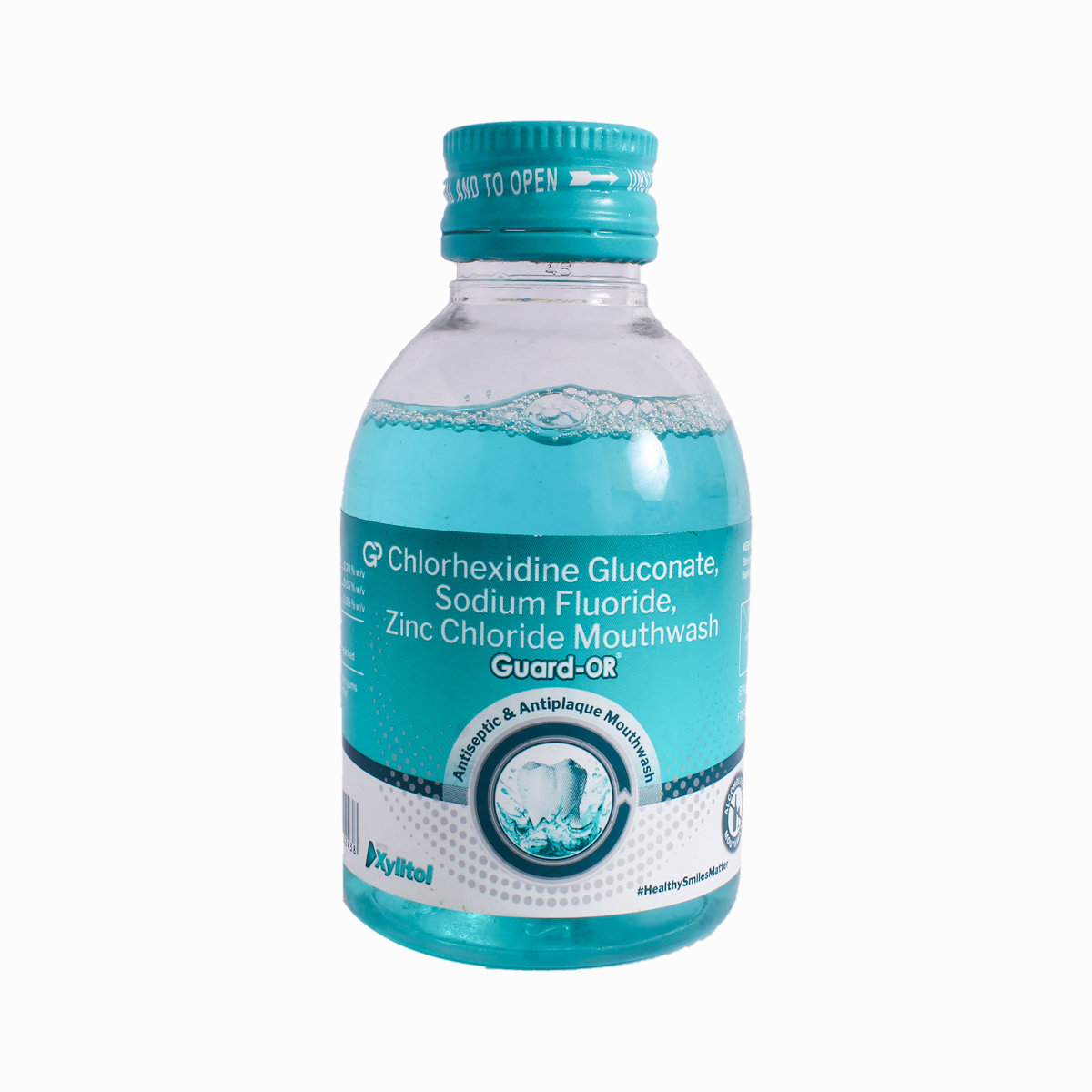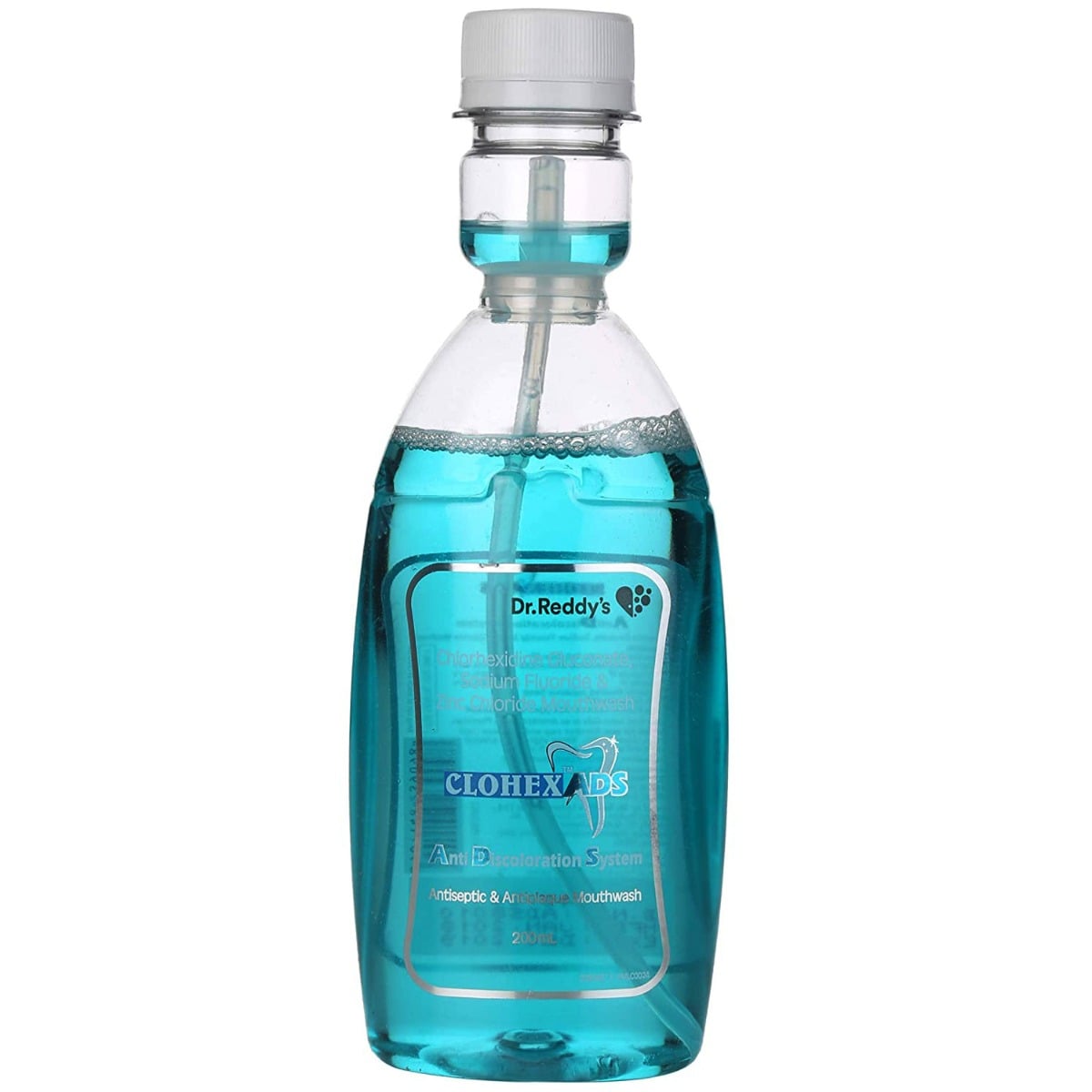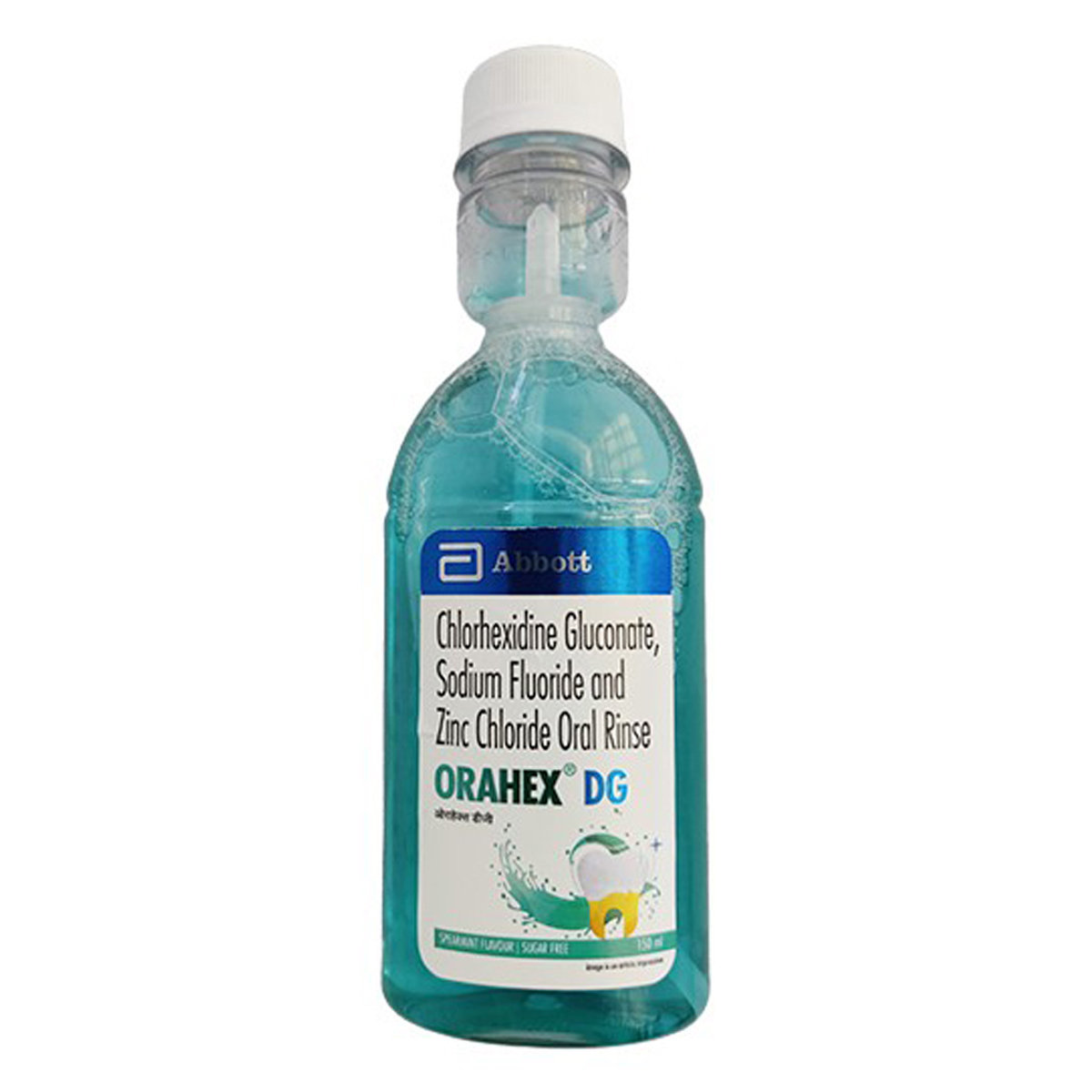Clohex ADS Mouthwash 80 ml
MRP ₹91
(Inclusive of all Taxes)
₹13.7 Cashback (15%)
Selected Pack Size:80 ml
80 ml ₹81.9
(₹1.02 per ml)
In Stock
200 ml ₹221.5
(₹1.11 per ml)
In Stock
About Clohex Ads Mouthwash
Clohex Ads Mouthwash belongs to a class of medication called 'antiseptic' primarily used to treat gingivitis and oral mucositis. Gingivitis is the inflammation of gum caused by harmful bacteria if left untreated can lead to periodontitis. This can cause the gum to separate from teeth leading to loss of teeth. Oral mucositis is tissue swelling in the mouth.
Clohex Ads Mouthwash contains Chlorhexidine, sodium fluoride, and zinc chloride. Chlorhexidine is an antiseptic. It works by binding to the surface of teeth, inner cheeks and gums. This kills the infectious microorganisms that cause gum disease, ulcers, and other mouth infections. Sodium Fluoride works by making the teeth stronger and preventing decay (cavity) caused by bacteria. Zinc Chloride has an antiseptic (prevents the growth of microorganisms), and astringent action (tightening of soft organic tissues).
The most common side effects of Clohex Ads Mouthwash are staining of teeth, taste change, hard dental plaque in some cases. Most of these side effects do not require medical attention and gradually resolve over time. However, if the side effects are persistent, reach out to your doctor.
Inform the doctor if you are allergic to Clohex Ads Mouthwash. Inform the doctor if you are pregnant, planning to become pregnant, or are breastfeeding before starting Clohex Ads Mouthwash. After using Clohex Ads Mouthwash, do not drink tea, coffee, or smoke. At least maintain a gap of 1 hour. To maintain good oral hygiene, try to brush your teeth at least 2 times a day to avoid any oral infection and its spread. Clohex Ads Mouthwash can cause allergic reactions, leading to a sudden pressure drop. If you feel any such symptoms, immediately stop taking Clohex Ads Mouthwash and contact your doctor.
Country of origin
Manufacturer/Marketer address
Online payment accepted

secured payment

india's most trusted pharmacy

genuine products
Manufacturer/Marketer :
Consume Type :
Expires on or after :
Return Policy :
Provide Delivery Location
About Clohex Ads Mouthwash
Clohex Ads Mouthwash belongs to a class of medication called 'antiseptic' primarily used to treat gingivitis and oral mucositis. Gingivitis is the inflammation of gum caused by harmful bacteria if left untreated can lead to periodontitis. This can cause the gum to separate from teeth leading to loss of teeth. Oral mucositis is tissue swelling in the mouth.
Clohex Ads Mouthwash contains Chlorhexidine, sodium fluoride, and zinc chloride. Chlorhexidine is an antiseptic. It works by binding to the surface of teeth, inner cheeks and gums. This kills the infectious microorganisms that cause gum disease, ulcers, and other mouth infections. Sodium Fluoride works by making the teeth stronger and preventing decay (cavity) caused by bacteria. Zinc Chloride has an antiseptic (prevents the growth of microorganisms), and astringent action (tightening of soft organic tissues).
The most common side effects of Clohex Ads Mouthwash are staining of teeth, taste change, hard dental plaque in some cases. Most of these side effects do not require medical attention and gradually resolve over time. However, if the side effects are persistent, reach out to your doctor.
Inform the doctor if you are allergic to Clohex Ads Mouthwash. Inform the doctor if you are pregnant, planning to become pregnant, or are breastfeeding before starting Clohex Ads Mouthwash. After using Clohex Ads Mouthwash, do not drink tea, coffee, or smoke. At least maintain a gap of 1 hour. To maintain good oral hygiene, try to brush your teeth at least 2 times a day to avoid any oral infection and its spread. Clohex Ads Mouthwash can cause allergic reactions, leading to a sudden pressure drop. If you feel any such symptoms, immediately stop taking Clohex Ads Mouthwash and contact your doctor.
Uses of Clohex Ads Mouthwash
Key Benefits
Clohex Ads Mouthwash contains Chlorhexidine, sodium fluoride and zinc chloride. Chlorhexidine is an antiseptic. It works by binding to the surface of teeth, inner cheeks, and gums. This kills the infectious microorganisms that cause gum disease, ulcers, and other mouth infections. Sodium Fluoride works by making the teeth stronger and preventing decay (cavity) caused by bacteria. Zinc Chloride has an antiseptic (prevents the growth of microorganisms), and astringent action (tightening of soft organic tissues). It is used in the treatment of gingivitis, oral mucositis and mouth odour.
Directions for Use
Storage
Side Effects of Clohex Ads Mouthwash
- Staining of teeth
- Taste change
- Hard dental plaque
Drug Warnings
Do not take Clohex Ads Mouthwash if you are allergic to Clohex Ads Mouthwash or any of its ingredients. If you are pregnant, planning to become pregnant, or are breastfeeding, please inform your doctor before starting Clohex Ads Mouthwash. In rare cases, Clohex Ads Mouthwash can cause allergic reactions, leading to a sudden pressure drop. If you feel any such symptoms, immediately stop taking Clohex Ads Mouthwash and contact your doctor. Clohex Ads Mouthwash contains aspartame, which can cause unpleasant side-effects in people with phenylketonuria. After using Clohex Ads Mouthwash, do not drink tea, coffee, or smoke, so try to maintain at least a gap of 1 hour. Clohex Ads Mouthwash use can cause the stain on teeth which can be removed from most tooth surfaces by conventional professional prophylactic techniques. To maintain good oral hygiene, try to brush your teeth at least 2 times a day to avoid any oral infection and its spread.
Drug Interactions
Drug-Drug Interaction: No interaction found.
Drug-Food Interaction: No interaction found.
Drug-Disease Interaction: No interaction found
Habit Forming
Diet & Lifestyle Advise
- Staining can be reduced by reducing tea, coffee, and red wine and brushing with toothpaste daily before using the gel.
- Intake of probiotics, prebiotics, and plenty of fluids is recommended to maintain a good bacteria level.
- Maintain good oral hygiene to avoid infection from spreading.
- Regular dental checkups can help in preventing the progression of the infection.
Special Advise
- Use of Clohex Ads Mouthwash may cause temporary discolouration of the teeth or tongue, which can be removed by twice-daily brushing with Clohex Ads Mouthwash or consulting your dentist.
- Avoid drinking beverages like tea or coffee and smoking, especially up to 1 hour after using Clohex Ads Mouthwash.
- Children under 12 years of age should not use Clohex Ads Mouthwash until and unless recommended by a dentist or doctor.
Disease/Condition Glossary
Gingivitis: It is a periodontal or gum disease with swollen and bleeding gums caused in response to bacterial biofilms (also called plaque) that is attached to tooth surfaces. If left untreated, which can lead to periodontitis and eventually loss of teeth. Its signs and symptoms include bleeding from gums, swollen gums, a loose tooth, and sometimes foul oral smell. Fusobacterium, Lachnospiraceae, Lautropia, Prevotella oulorum, and Rothia dentocariosa are some harmful bacteria that cause dental and gum problems.
Oral mucositis: Oral mucositis refers to erythematous, erosive, and ulcerative lesions of the oral mucosa. Symptoms include sores in the mouth, gums or tongue.
FAQs
Disclaimer
Alcohol
Safe if prescribed
Limit consumption of alcohol while using Clohex Ads Mouthwash
Pregnancy
Consult your doctor
Clohex Ads Mouthwash is a pregnancy risk category B. It is not known whether it will harm the baby. So, take it only if recommended by a doctor and if risks outweigh the benefits.
Breast Feeding
Consult your doctor
It is not known whether Clohex Ads Mouthwash passes through breastmilk. So, breastfeeding women should take Clohex Ads Mouthwash only if recommended by a doctor.
Driving
Safe if prescribed
Clohex Ads Mouthwash does not cause any effect on driving a motor vehicle.
Liver
Consult your doctor
Clohex Ads Mouthwash can be given in case of any liver impairment. However, please consult your doctor before taking Clohex Ads Mouthwash if you have liver problems.
Kidney
Consult your doctor
Clohex Ads Mouthwash can be given in case of any kidney impairment. However, please consult your doctor before taking Clohex Ads Mouthwash if you have kidney problems.
Children
Safe if prescribed
Children under 12 years of age should not use the Clohex Ads Mouthwash unless recommended by a healthcare professional
Uses of Clohex Ads Mouthwash
Key Benefits
Clohex Ads Mouthwash contains Chlorhexidine, sodium fluoride and zinc chloride. Chlorhexidine is an antiseptic. It works by binding to the surface of teeth, inner cheeks, and gums. This kills the infectious microorganisms that cause gum disease, ulcers, and other mouth infections. Sodium Fluoride works by making the teeth stronger and preventing decay (cavity) caused by bacteria. Zinc Chloride has an antiseptic (prevents the growth of microorganisms), and astringent action (tightening of soft organic tissues). It is used in the treatment of gingivitis, oral mucositis and mouth odour.
- Inform your doctor about the symptoms you're experiencing due to medication.
- Your doctor may adjust your treatment plan, which could include changing your medication, adding new medications, or offering advice on managing your symptoms.
- Practice good hygiene, including frequent handwashing, avoiding close contact with others, and avoiding sharing utensils or personal items.
- Stay hydrated by drinking plenty of fluids to help loosen and clear mucus from your nose, throat, and airways.
- Get plenty of rest and engage in stress-reducing activities to help your body recover. If your symptoms don't subside or worsen, consult your doctor for further guidance.
- Consult your doctor if you experience symptoms of sinusitis, such as nasal congestion, facial pain, or headaches, which may be triggered by your medication.
- Your doctor may adjust your treatment plan by changing your medication, adding new medications, or providing guidance on managing your sinusitis symptoms.
- Practice good hygiene, including frequent handwashing, avoiding close contact with others, and avoiding sharing utensils or personal items.
- If your doctor advises, you can use nasal decongestants or saline nasal sprays to help relieve nasal congestion and sinus pressure.
- To help your body recover, get plenty of rest, stay hydrated, and engage in stress-reducing activities. If your symptoms persist or worsen, consult your doctor for further guidance.
- Inform your doctor about dry mouth symptoms. They may adjust your medication regimen or prescribe additional medications to manage symptoms.
- Drink plenty of water throughout the day to help keep your mouth moist and alleviate dry mouth symptoms.
- Chew sugar-free gum or candies to increase saliva production and keep your mouth moisturized.
- Use saliva substitutes, such as mouthwashes or sprays, only if your doctor advises them to help moisturize your mouth and alleviate dry mouth symptoms.
- Avoid consuming smoking, alcohol, spicy or acidic foods, and other irritants that may aggravate dry mouth symptoms.
- Schedule regular dental check-ups to keep track of your oral health and handle any dry mouth issues as they arise.
- Talk to your doctor about adjusting the medication, such as reducing your dosage or switching drugs if necessary.
- Use mouth rinses with numbing agents like lidocaine for temporary pain relief and artificial saliva to help with dry mouth.
- Stay away from acidic foods and drinks like tomatoes, soda, orange juice, and coffee.
- Avoid alcohol and tobacco products, as they can irritate your mouth.
- Do not eat spicy or hot foods that might cause discomfort.
- Try using mild, flavour-free toothpaste, like those for sensitive teeth, without mint or cinnamon.
- Manage stress with relaxation techniques to help ease symptoms.
Directions for Use
Storage
Drug Warnings
Do not take Clohex Ads Mouthwash if you are allergic to Clohex Ads Mouthwash or any of its ingredients. If you are pregnant, planning to become pregnant, or are breastfeeding, please inform your doctor before starting Clohex Ads Mouthwash. In rare cases, Clohex Ads Mouthwash can cause allergic reactions, leading to a sudden pressure drop. If you feel any such symptoms, immediately stop taking Clohex Ads Mouthwash and contact your doctor. Clohex Ads Mouthwash contains aspartame, which can cause unpleasant side-effects in people with phenylketonuria. After using Clohex Ads Mouthwash, do not drink tea, coffee, or smoke, so try to maintain at least a gap of 1 hour. Clohex Ads Mouthwash use can cause the stain on teeth which can be removed from most tooth surfaces by conventional professional prophylactic techniques. To maintain good oral hygiene, try to brush your teeth at least 2 times a day to avoid any oral infection and its spread.
Therapeutic Class
Drug-Drug Interactions
Drug-Drug Interactions
Login/Sign Up
Diet & Lifestyle Advise
- Staining can be reduced by reducing tea, coffee, and red wine and brushing with toothpaste daily before using the gel.
- Intake of probiotics, prebiotics, and plenty of fluids is recommended to maintain a good bacteria level.
- Maintain good oral hygiene to avoid infection from spreading.
- Regular dental checkups can help in preventing the progression of the infection.
Habit Forming
Side Effects of Clohex Ads Mouthwash
- Staining of teeth
- Taste change
- Hard dental plaque
Special Advise
- Use of Clohex Ads Mouthwash may cause temporary discolouration of the teeth or tongue, which can be removed by twice-daily brushing with Clohex Ads Mouthwash or consulting your dentist.
- Avoid drinking beverages like tea or coffee and smoking, especially up to 1 hour after using Clohex Ads Mouthwash.
- Children under 12 years of age should not use Clohex Ads Mouthwash until and unless recommended by a dentist or doctor.
Disease/Condition Glossary
Gingivitis: It is a periodontal or gum disease with swollen and bleeding gums caused in response to bacterial biofilms (also called plaque) that is attached to tooth surfaces. If left untreated, which can lead to periodontitis and eventually loss of teeth. Its signs and symptoms include bleeding from gums, swollen gums, a loose tooth, and sometimes foul oral smell. Fusobacterium, Lachnospiraceae, Lautropia, Prevotella oulorum, and Rothia dentocariosa are some harmful bacteria that cause dental and gum problems.
Oral mucositis: Oral mucositis refers to erythematous, erosive, and ulcerative lesions of the oral mucosa. Symptoms include sores in the mouth, gums or tongue.
All Substitutes & Brand Comparisons
RX
Out of StockSensoseal Mouth Wash 100 ml
Torque Pharmaceuticals Pvt Ltd
₹45
(₹0.45/ 1ml)
55% CHEAPERRX
Out of StockDentasep-F Mouthwash 100 ml
Stedman Pharmaceuticals Pvt Ltd
₹65.5
(₹0.66/ 1ml)
35% CHEAPERRX
Out of StockAmayzing Mouth Wash 100Ml
Nectar Lifesciences Ltd
₹77
(₹0.69/ 1ml)
32% CHEAPER

Have a query?

